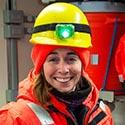By: Evie Fachon, Anderson Lab, Woods Hole Oceanographic Institution
In this new Witness Community Highlights video feature, Evie Fachon, Anderson Lab, Woods Hole Oceanographic Institution talks about her work researching Harmful Algal Blooms (HABs) in the Arctic and their impact on the health of the ecosystem and local communities. She also explains how the public can interact with this research through the HABhub.
Further information about Harmful Algal Blooms is found at the U.S. National Office for Harmful Algal Blooms
More information about Fachon's outreach efforts can be found on the PolarTREC webpages: Harmful Algal Blooms in Arctic Waters, the PolarConnect event she participated in with PolarTREC teacher, Rebecca Siegel; and related photos found in the PolarTREC 2022 Polar Media Archive.
The U.S. National Office for Harmful Algal Blooms is supported by funding from NOAA's National Centers for Coastal Ocean Science (NCCOS) through the Cooperative Institute for the North Atlantic Region (CINAR) (NA14OAR4320158, NA19OAR4320074). Additional funding for Arctic HAB research is provided NSF Office of Polar Programs (OPP-1823002) and NOAA's Center for Coastal and Ocean Studies ECOHAB Program (NA20NOS4780195). Fachon is supported by the National Science Foundation Graduate Research Fellowship Grant No. 2141064 and the North Pacific Research Board Graduate Student Research Award.
This video was produced by Joed Polly, (ARCUS) for Witness Community Highlights, supported by the National Science Foundation under Cooperative Agreement No. PLR-1928794.
Photos and videos courtesy of Lindsey Leigh Graham (NOAA), Evie Fachon (WHOI), Kali Horn (WHOI), Rebecca Siegel (PolarTREC 2022), Peigen Lin (WHOI) and Wendi Pillars (PolarTREC 2018).
About Evie Fachon
 Evie Fachon is a PhD candidate in the Anderson Lab at the Woods Hole Oceanographic Institution, where she studies harmful algal blooms (HABs) in the Alaskan Arctic. Her thesis work focused on bloom dynamics, connectivity and toxicity of the harmful dinoflagellate Alexandrium catenella. She also works with other HAB species, including Pseudo-nitzschia and Gambierdiscus. Fachon says that education and outreach is hugely important to the work they do. In 2022, they partnered with the PolarTREC program to host an educator during the summer field season, and since then she has continued to work on developing HAB and phytoplankton-focused lesson plans for middle/high school and college-level classrooms.
Evie Fachon is a PhD candidate in the Anderson Lab at the Woods Hole Oceanographic Institution, where she studies harmful algal blooms (HABs) in the Alaskan Arctic. Her thesis work focused on bloom dynamics, connectivity and toxicity of the harmful dinoflagellate Alexandrium catenella. She also works with other HAB species, including Pseudo-nitzschia and Gambierdiscus. Fachon says that education and outreach is hugely important to the work they do. In 2022, they partnered with the PolarTREC program to host an educator during the summer field season, and since then she has continued to work on developing HAB and phytoplankton-focused lesson plans for middle/high school and college-level classrooms.
